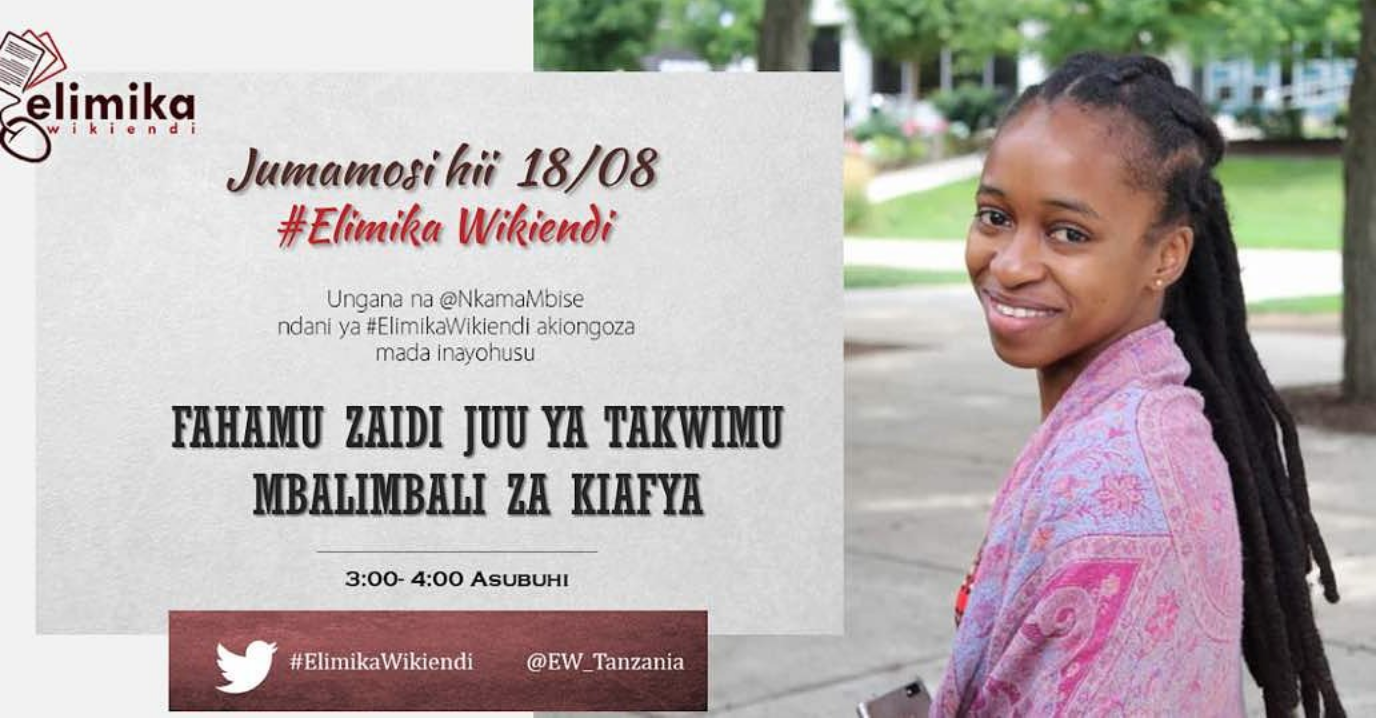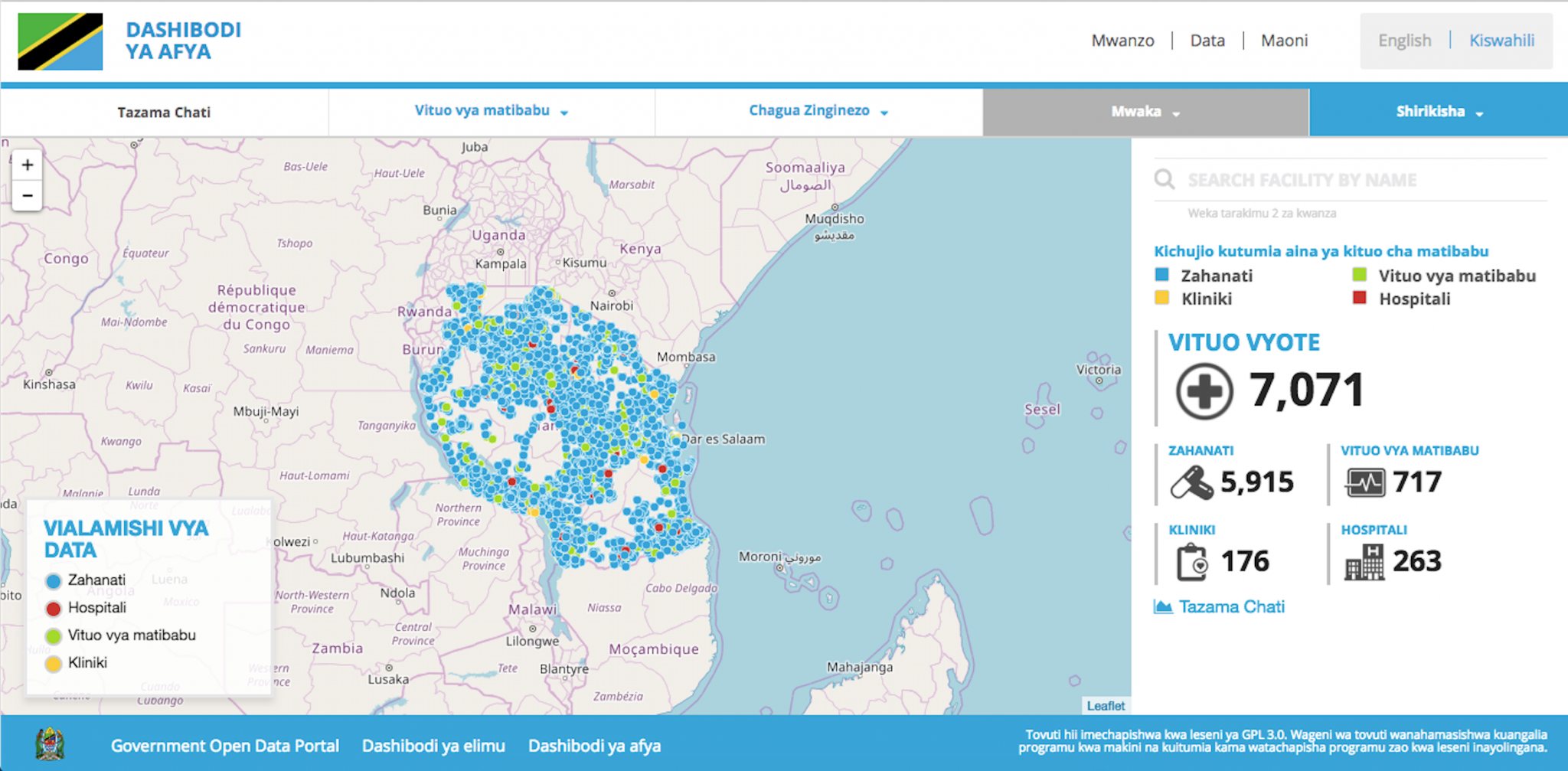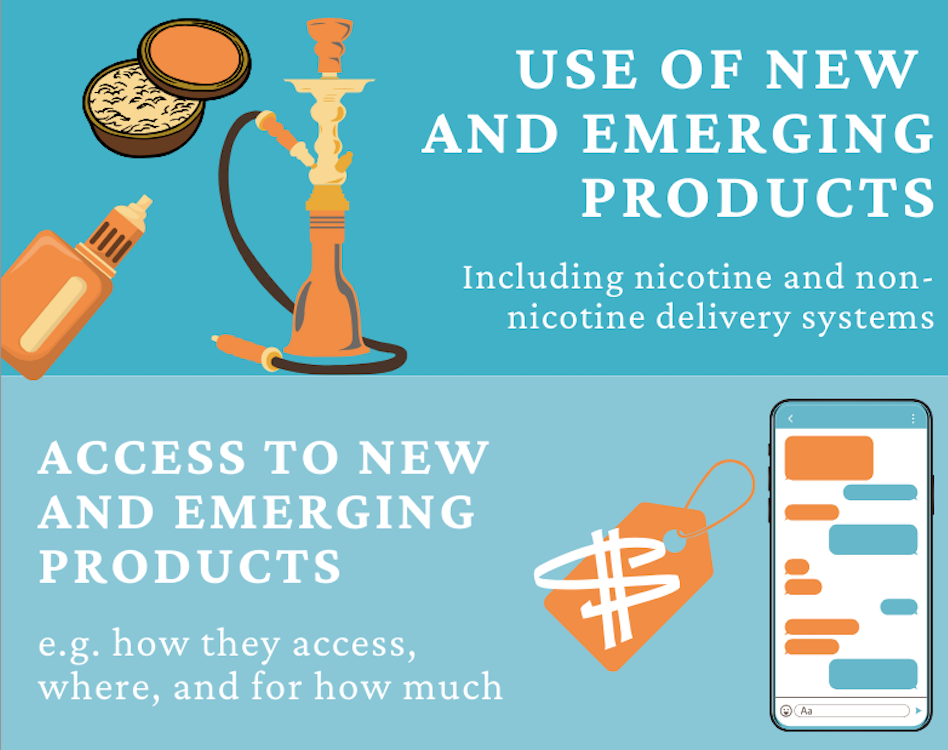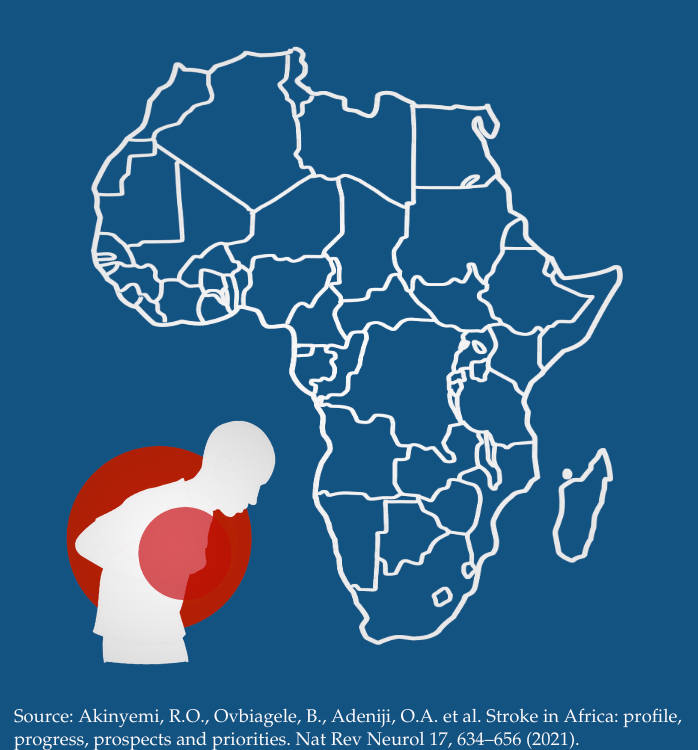#ElimikaWikiendi and Strengthening Health Data in Tanzania // #ElimikaWikiendi na Uboreshaji wa Takwimu za Afya Tanzania

Figure 1: Itanisa Mbise as a co-host on Elimika Wikiendi last week
DG recently participated in Elimika Wikiendi, an open online space for Kiswahili speakers to discuss issues including health, research, development, and technology in Tanzania and East Africa. The platform educates, raises awareness, and prompts online dialogue using the hashtag #ElimikaWikiendi.
Elimika Wikiendi translates to “Get Educated on the Weekend,” and runs for 5 hours every Saturday as guest curators and experts use the platform to talk about issues that matter to them and their communities. Each weekend, the hashtag generates about 5 million impressions and reaches up to 1.5 million Twitter users.
Through the Data Zetu project, which is a part of the Data Collaboratives for Local Impact (DCLI) program, IREX is running a Practicum in which DCLI Fellows are spending the month of August working for organizations focused on data sharing and use, including DG, Open Data Watch, and the Millennium Challenge Corporation (MCC). Last week’s Elimika Wikiendi was led by two of this year’s DCLI Practicum fellows: DG’s Itanisa Mbise, and MCC’s Dr. Joachim Mabula.

Figure 2: #ElimikaWikiendi Twitter engagement, showing a graph from the Tanzania Health Dashboard
As you may have guessed, our engagement focused on data. Specifically, we delved into how data is currently being used by the Government of Tanzania and health service providers in fighting HIV/AIDS in the country. We know that data matters and is key in successful health outcome improvement, but citizens – both in Tanzania and globally – need to know what data is available, and how and where to find it.
In highlighting the causes, prevention efforts, and health services available for Tanzanians living with HIV/AIDS, we showcased DG’s Tanzania Health Dashboard, available in Kiswahili and English, as a public data resource for anyone looking to access information on the 7,071 health centres and 2,672 HIV/AIDS treatment centres in Tanzania. Through Elimika Wikiendi, we heightened citizen awareness of the dashboards, inviting more people to explore them and provide valuable feedback on their usefulness.

Figure 3: All 7,071 health facilities in Tanzania, including dispensaries, clinics, health centres, and hospitals.
A few highlight tweets from #ElimikaWikiendi:
“Data collection on health care services provided by HIV/AIDS services providers helps policy providers and policymakers determine the needs of each facility including doctors, and antiretroviral drugs according to the number of patients in each facility.” — English and Kiswahili tweets
“Health statistics help healthcare providers and the govt. understand the steps involved in achieving the SDGs, specifically aimed at reducing maternal and infants mortality; and fight against HIV, malaria, and other diseases.” — English and Kiswahili tweets
In the coming weeks, we’ll be digging deeper into showcasing the Tanzania Sectoral Dashboards in a global policy setting. At the International Open Data Conference in September, we’ll be presenting on the Water Point Mapping System in an TED-talk style Impact Track session. If you’ll be at #IODC18, you won’t want to miss it.
Stay tuned and keep an eye on the DG blog for more updates on all things DCLI Practicum, health data in Tanzania, and IODC 2018!
Itanisa Mbise is a DCLI Practicum Fellow from Tanzania, embedded at DG for the month of August. She was based at Drexel University in Philadelphia for the duration of the Mandela Washington Fellowship program. Itanisa works for C-Sema, at the intersection of data, communication, and child protection.
The United States President’s Emergency Plan for AIDS Relief (PEPFAR) and the Millennium Challenge Corporation (MCC) are partnering to support innovative approaches to ensure evidence-based decision-making for programs and policies that address HIV/AIDS, global health, gender equality and economic growth in sub-Saharan Africa. The Data Collaboratives for Local Impact (DCLI) program was launched in April 2015, with investments underway in Tanzania and Cote d’Ivoire. These projects are funded by PEPFAR with oversight from MCC, and are intended to strengthen the availability and use of data to improve lives and empower citizens to hold governments and donors more accountable for results.
__________________________________________________
Hivi karibuni Development Gateway imeshiriki katika Elimika Wikiendi, Jukwaa la wazi la wazungumzaji wa Kiswahili kujadili mada mbalimbali zikiwemo afya, utafiti, maendeleo na teknolojia nchini Tanzania na Afrika Mashariki. Jukwaa huelimisha, huhamasisha na kuchochea mijadala kupitia mtandao kwa kutumia kiunganishireli (hashtag) cha #ElimikaWikiendi.
Mantiki ya Elimika Wikiendi ni “Pata kuelimishwa mwishojuma (mwisho wa wiki),” na huendeshwa kwa masaa 5 kila Jumamosi ambapo waandaaji na wataalamu wa mada husika hutumia jukwaa hili kuelimisha na kujadiliana na watu kuhusu mada husika yenye manufaa kwao na kwa jamii nzima. Kiunganishireli hiki huonwa na takribani watu milioni 5 na mada zinazojadiliwa huwavutia watumiaji wa Twitter takribani milioni moja na nusu wanaokitumia kuchangia mada mbalimbali.
Kupitia mradi wa Data Zetu , ambao ni sehemu ya mpango Data Collaboratives for Local Impact (DCLI), IREX inaendesha program ya mafunzo ambapo washiriki wanne wa DCLI wanautumia mwezi wa nane kufanya kazi na mashirika yanayojikita katika utumiaji na usambazaji wa takwimu likiwemo shirika la Development Gateway, Open Data Watch, na Millennium Challenge Corporation (MCC). Elimika Wikiendi ya wiki hii iliendeshwa na washiriki wawili wa wa mwaka huu: Itanisa Mbise aliopo katika shirika la DG, na Dr. Joachim Mabula aliopo katika shirika la MCC.
Share This Post
Related from our library

The Cancer-Tobacco Link: Using Data to Drive Stronger Tobacco Control Policies
As we observe World Cancer Day today, it is crucial to recognize the significant role smoking plays in the global cancer epidemic. Tobacco use is the leading preventable cause of cancer and cancer-related deaths worldwide, necessitating a dynamic, multidisciplinary approach to tobacco control interventions. DG’s Tobacco Control Data Initiative (TCDI) contains country-specific websites designed to

Diving into the DaYTA Program’s Data Collection Process
This blog explores key insights from the DaYTA program, offering practical guidance for researchers on effective data collection, overcoming field challenges, and leveraging local partnerships to enhance tobacco control efforts. This piece is especially timely following DaYTA’s workshop convening all 3 study country stakeholders to review the survey results and strategize on how best to disseminate this data to target audiences. This workshop took place from in Lagos, Nigeria, from November 18-20th.

More Smoke, More Stroke
In honor of this year’s World Stroke Day, observed annually on October 29th, this piece aims to raise awareness of the substantial burden of non-communicable diseases–particularly stroke incidents–using the case study of Nigeria, one of the main tobacco production hubs on the continent, in addition to Kenya.